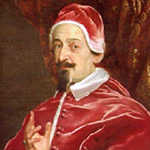
Alexander VII was the 237th person to lead the Catholic Church and the seventh among them to take the papal name of Alexander. This article intends to distinguish him from the many other men to have donned the crown and vestments of his title in the hope that the information will better stand out in the mind of its audience.
Origins and Elevation to Bishop.
He was born to the Chigi banking family and was able to afford a private education that would grant him three doctorates. This man, whose normal name was Fabio Chigi focused on the studies of philosophy, law and theology within the University of Siena.
By the year 1627, Fabio had started his apprenticeship as a vice-papal legate of Ferrara, then being elevated to Inquisitor of Malta on the recommendation of two cardinals. He would become a full priest in December of 1634, appointed to the position of Referendarius utriusque signaturae.
A month later, he was made Bishop of Nardo. His next job transfer would come on May 13, 1652; he would be transferred to the Bishopric of Imola.
Nuncio Chigi.
Between his Bishopric work in Nardo and Imola, he also served as Cologne’s nuncio. It is during his time in Cologne that Fabio agreed with Pope Urban VIII’s condemnation of Cornelius Jansen’s “Augustinus.” While it was expected that he would involve himself in the preliminary negotiations of the Peace of Westphalia, Bishop Chigi was among several Catholic delegates who decided to pass on dealing with Protestants, whom the Church deemed to be heretics.
This forced the negotiations to happen in two places: Osnabrück and Münster. This involved sending messengers to relay messages between the Catholic and Protestant delegates.
Chigi spoke on behalf of the Papacy in his disdain for the Treaty of Westphalia; Pope Innocent X remarked that the Peace was a bad idea in a number of interesting and boisterous ways. It should be noted that this Peace stopped the Thirty Years’ War and maintained equilibrium within European politics for 141 years.
Final Elevation.
After being recalled to Rome, Cardinal Chigi was made Secretery of State in December of 1651. Two months later, he would be promoted to cardinal. A month after that would see him become Cardinal-Priest of Santa Maria del Popolo.
List of Events In The Life of Pope Alexander VII (Fabio Chigi)
| Date | Age | Event | Title |
|---|---|---|---|
| 13 Feb 1599 | Born | ||
| Dec 1634 | 35.8 | Ordained Priest | Priest |
| 8 Jan 1635 | 35.9 | Appointed | Bishop of Nardò, Italy |
| 1 Jul 1635 | 36.3 | Ordained Bishop | Bishop of Nardò, Italy |
| 13 Jun 1639 | 40.3 | Appointed | Apostolic Nuncio to Germany |
| Oct 1651 | 52.6 | Resigned | Apostolic Nuncio to Germany |
| Dec 1651 | 52.8 | Appointed | Secretary of State |
| Feb 1652 | 52.9 | Resigned | Bishop of Nardò, Italy |
| 19 Feb 1652 | 53.0 | Elevated to Cardinal | |
| 12 Mar 1652 | 53.0 | Installed | Cardinal-Priest of Santa Maria del Popolo |
| 13 May 1653 | 54.2 | Appointed | Archbishop (Personal Title) of Imola, Italy |
| 7 Jan 1655 | 55.9 | Resigned | Secretary of State |
| 7 Apr 1655 | 56.1 | Elected | Pope (Roma, Italy) |
| 18 Apr 1655 | 56.1 | Installed | Pope (Roma, Italy) |
| 22 May 1667 | 68.2 | Died | Pope (Roma, Italy) |
Papal Legacy
- He is among the most prolific of popes to take an interest in Rome’s architectural development.
- He was not fond of the statesmanship involved in his position and preferred the philosophical and spiritual elements.
- He continually clashed with French clergymen.
Quick Facts About Alexander VII.
- He was born in the Grand Duchy of Tuscany on February 13th, 1599.
- His given name was Fabio Chigi.
- He died on May 27th, 1667.
- He died of kidney failure. Unlike most popes, he acknowledged his mortality by keeping his coffin and a carved skull within his personal room.
- His papacy began on April 7th, 1655.
- His papacy ended with his life.
- His papal successor was Clement IX.
Five Interesting Facts About Alexander VII.
- He believed in heliocentrism enough to write on the subject. Heliocentrism is the belief that the sun, rather than the Earth, is the center of the solar system.
- He was the great-nephew of Pope Paul V.
- While he began his papacy with a great disdain for nepotism, giving someone a job due to family connections over ability or aptitude, this stance shifted over time.
- He personally baptized the recently-abdicated Queen Christina of Sweden.
- His papal motto was “Montium custos,” which translates as “Mountain guardian.”
All Popes with the name “Alexander”
There has has been 7 Popes that have taken the name Alexander. Below are links to all of them. Also check out all of the other Popes the begin with the letter A.
Alexander I (St.) (#6) (105 – 115)
Alexander II (#157) (1061 – 1073)
Alexander III (#171) (1159 – 1181)
Alexander IV (#182) (1254 – 1261)
Alexander VI (#215) (1492 – 1503)
Alexander VII (#238) (1655 – 1667)
Alexander VIII (#242) (1689 – 1691)